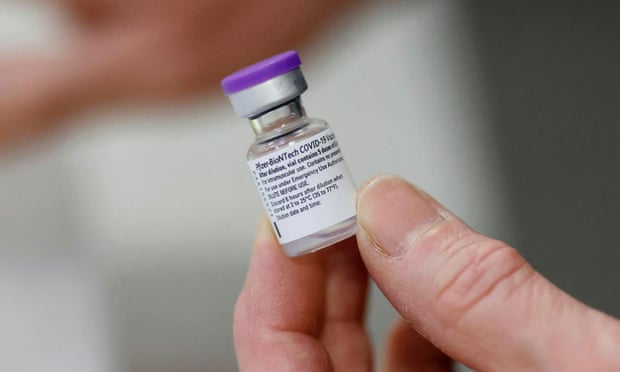Over-70s of black African heritage in England are 7.4 times more likely not to have received a first dose of a coronavirus vaccine compared with their white British counterparts, according to analysis by the Office for National Statistics.
The ONS found that 90.2% of all over-70s resident in England had received at least one jab between 8 December last year and 11 March but the percentage vaccinated was lower among all minority ethnic groups compared with the white British population.
The lowest rate was among people identifying as black African (58.8%), followed by those of black Caribbean (68.7%), Bangladeshi (72.7%) and Pakistani (74.0%) heritage.
The ONS found that even after adjusting for age, sex, socio-demographic characteristics and underlying health conditions, the odds of someone of black African heritage not having received a first dose were still 5.5 times greater, compared with someone of white British ethnicity.
The data, published on Monday, confirms fears that some marginalised groups are not being adequately reached by the vaccination programme, despite attempts to address the issue, including £23m in funding pledged by the government.
Layla Moran, the Liberal Democrat MP and chair of the all-party parliamentary group on coronavirus, said: “These stark figures reveal the deeply alarming low uptake of the vaccine among ethnic minority groups, who we know are particularly vulnerable to serious disease from Covid-19.
“This confirms the evidence our cross-party inquiry heard last month, which underlined the need to work with local communities, leaders and places of worship to build trust in the vaccine.
“The government and NHS must urgently step up efforts to tackle vaccine hesitancy among ethnic minority groups.”
The highest rates of vaccination were among white British people (91.3%) and those of Indian heritage (86.2%).
In the first wave of the pandemic last year, people in minority ethnic groups were more likely to die from Covid than the white British population. They are believed to have been targeted by anti-vaxxers, spreading misinformation that vaccines contain alcohol or animal products. Language barriers and past negative experiences with the NHS have also been cited as reasons for vaccine hesitancy.
Halima Begum, the chief executive of the Runnymede Trust, said: “We continue to urge the authorities to take the vaccine out into the community, door to door if necessary, and to ensure that the message is clear: the vaccine is for everyone, regardless of our ethnicity or our immigration status.”
The ONS analysis, the first official breakdown of immunisation data by socio-demographic characteristics, showed vaccination rates also differed by religious affiliation, with the lowest rate among Muslims (72.3%), followed by Buddhists (78.1%).
Quick Guide
Vaccines: how effective is each one?

Pfizer/BioNTech
Country US/Germany
Efficacy 95% a week after the second shot. Pfizer says it is only 52% after the first dose but the UK’s Joint Committee on Vaccination and Immunisation (JCVI) says this may rise to 90% after 21 days.
Doses Clinical trials involved two doses 21 days apart. The UK is stretching this to 12 weeks.
Oxford/AstraZeneca
Country UK
Efficacy 70.4% 14 days after receiving the second dose. May have up to 90% efficacy when given as a half dose followed by a full dose. No severe disease or hospitalisations in anyone who received the vaccine. There have been concerns it is less effective against the South African variant of the coronavirus.
Doses Two, four to 12 weeks apart
Moderna
Country US
Efficacy Phase 3 trial results suggest 94.1%.
Doses Two, 28 days apart
Novavax
Country US
Efficacy Phase 3 trials suggest 89.3%.
Doses Two
Janssen (part of Johnson & Johnson)
Country US
Efficacy 72% in preventing mild to moderate cases in US trials but 66% efficacy observed in international trials. 85% efficacy against severe illness, and 100% protection against hospitalisation and death.
Doses: One, making it unique among Covid vaccines with phase 3 results so far
Disabled people who reported being limited a lot in their day-to-day activities had lower rates of vaccination (86.6%) compared with those who were non-disabled (91.0%), while people living in more deprived areas (87.0%) were less likely to have been vaccinated than those in less deprived areas (92.1%).
Dr Habib Naqvi, the director of the NHS Race and Health Observatory, said: “The observatory remains concerned that vaccine uptake for Covid-19 is potentially lower amongst some minority ethnic and religious groups, and is continuing to urgently explore practical solutions to help support the NHS and its ongoing response to this challenge.
“The emerging effort to build levels of confidence and trust, involving community and faith leaders, is now being factored within the vaccine programme.”
This content first appear on the guardian
